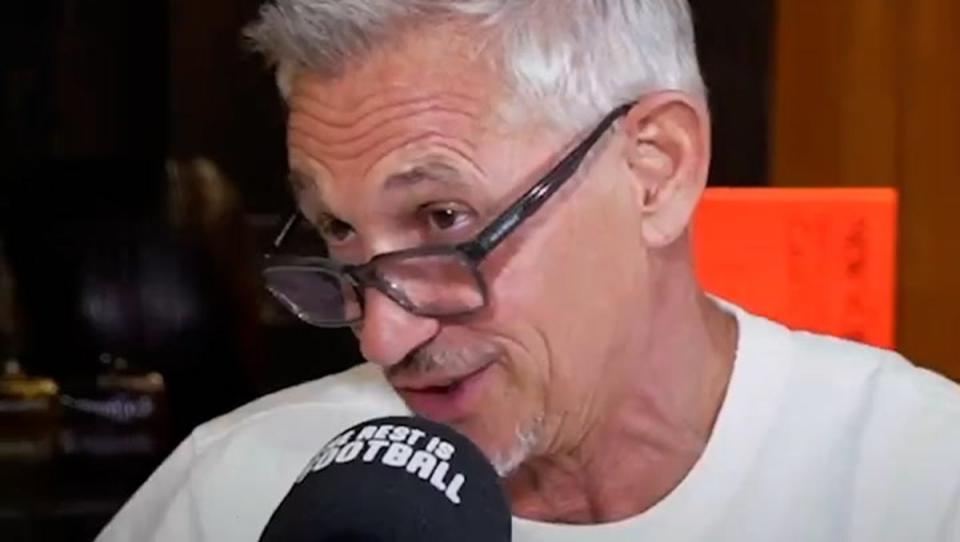Gary Lineker became the face of the BBC – but his exit shows everyone is replaceable
Once again, Gary Lineker will reach the end in a major tournament. This time, at least, he will not go out in the group stage or be replaced by Alan Smith. But, 34 years after Graham Taylor made one of the most infamous substitutions in England’s history, curtailing Lineker’s international career when he was one behind Bobby Charlton’s longstanding record for goals, he will bow out of the BBC at the 2026 World Cup.
At a time of momentous global developments, it is front-page news. If that highlights the huge role he has played in the worlds of football and media over the last four decades, it also shows the way Lineker became a lightning rod, his contract and tweets rendering him more controversial off the pitch than on it. Which, in turn, is a sign of strange times.
And yet his departure is also unsurprising news. Some BBC insiders recently felt it was 50-50 if Lineker left at the end of this season or got a one-year extension to his deal to enable a World Cup Golden Boot winner to go out at a tournament that defined him. In a way, both happened: he will finish up presenting Match Of The Day’s Premier League highlights in 2025. The early news of his exit illustrates that the new BBC director of sport Alex Kay-Jelski has wasted little time in effecting change; some within the BBC thought he wanted Lineker gone.
The exit of Jermaine Jenas, for rather different reasons, removes one possible successor; Jenas’s rapid rise, however, was a sign of the opportunities granted to former footballers whereas Lineker was a rarity – a penalty-area poacher who became an outstanding broadcaster in his own right, as relaxed on the box and as he used to be in it.
If, at times, he called upon his own knowledge, of the art of striking and the footballers and managers he knew as a player, too rarely, his footballing opinions carried weight. There are other fine broadcasters, but Lineker’s playing career gave him a unique status.
Across a quarter of a century, Des Lynam’s apprentice became the definitive Match Of The Day host. In the process, it became an anomaly, a terrestrial television show with a centrality in the age of satellite and streaming. It reflects the enduring success of the format and the right time slot, but also the presenter.


He is nevertheless replaceable. Mark Chapman, an engaging everyman who makes a difficult job appear easy, is seen by many inside the BBC as the heir apparent. There is loyalty within the corporation to the long-serving Chapman; plenty would welcome the elevation of an excellent broadcaster. There is also as the possibility he would continue working on Radio 5 Live. In turn, that could deflect criticism: Chapman, unlike Lineker, would not be the best-paid BBC employee but he would also be a busier one if his duties straddle more shows. Lineker’s salary stood out whenever the BBC published their top earners.
And Lineker’s relationship with the BBC has attracted more attention in recent years. He has always spoken very respectfully of the corporation. He has been the face of the corporation in some respects, a voice outside it in others.
His suspension from Match Of The Day in March 2023, for a tweet likening then home secretary Suella Braverman’s language on asylum seekers to 1930s Germany, backfired for the BBC in the short term; in the long term, however, it may have added to the feeling a parting of the ways was inevitable.
It remains pertinent, however, that the right-wing culture warriors who latched on to Lineker’s political utterances would have had rather fewer problems if his views echoed theirs. Lineker became a symptom of more dystopian times; perhaps he should have stayed silent and many other BBC employees deliberately do not comment on such issues. But a market trader’s son from Leicester has shown an intellectual curiosity. His interests have expanded far beyond tap-ins. Lineker’s footballing life has given him a platform. He chose to use it.

Besides principles, he has business acumen and he has used his astuteness to take on the BBC. Lineker’s stable of podcasts, made by his production company, Goalhanger, have assumed a permanent presence at the top of the charts. An already wealthy man probably has a huge income from The Rest Is History, The Rest Is Politics, The Rest is Entertainment, The Rest is Money and, of course, The Rest Is Football.
In an interview with The Independent a couple of months ago, Lineker denied there was a conflict of interest when he, Alan Shearer and Micah Richards worked for the BBC and on The Rest Is Football. While he argued it was mutually beneficial, some at the BBC disagreed.
In the future, Lineker may only have one outlet for his views though presumably Shearer and Richards, fundamental to the BBC’s coverage, will remain on television and radio as well. He might miss the buzz of live broadcasting. “I love being part of Match of the Day, I love working for the BBC,” he said a couple of months ago. Once again, Lineker may not have got the ending he wanted.

